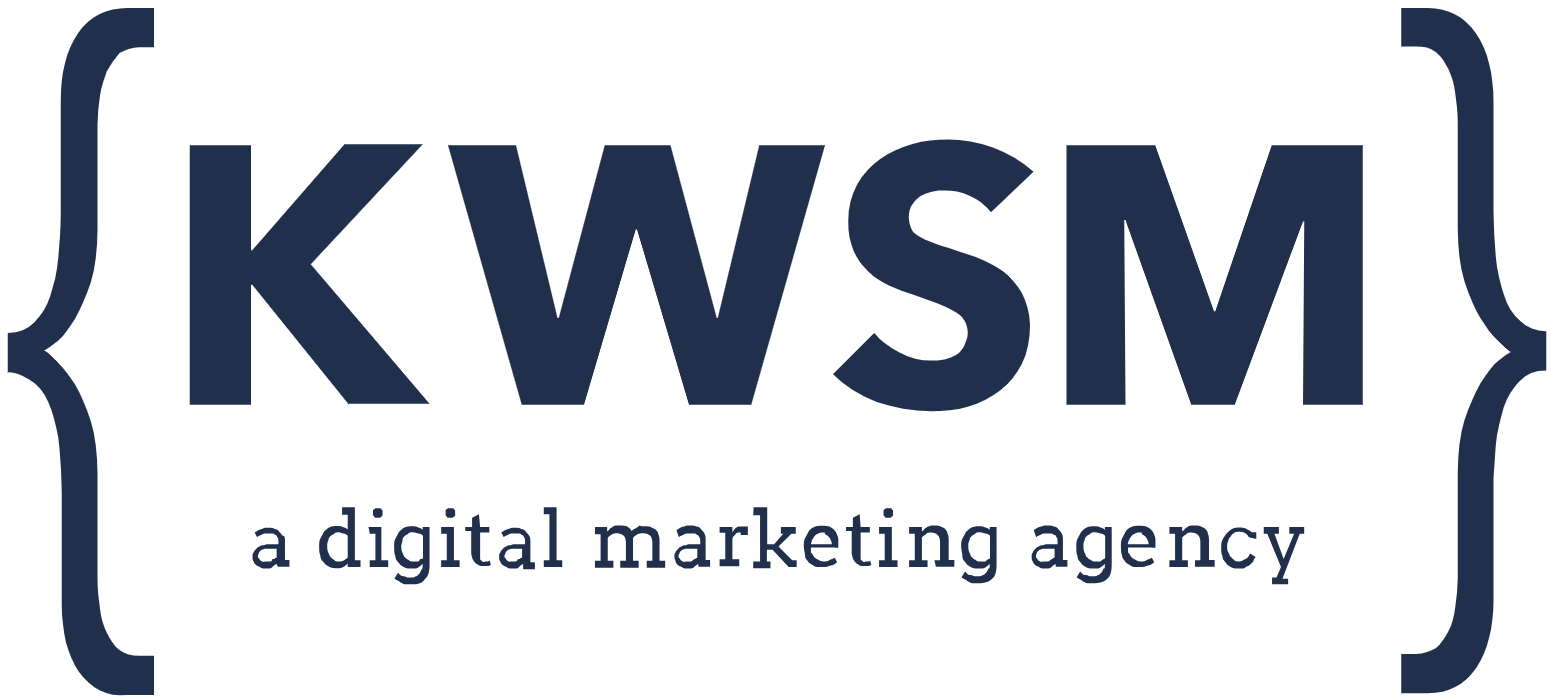
How should you hire a web development company for your brand or business?
Hiring a web development company goes beyond technical knowledge. As a business owner, you need a partner who will ensure that your website is reliable, secure, accessible for all users, and built with the infrastructure you need for marketing success.
In other words, there are a lot of factors to consider and questions to ask before you sign on with a web development company. After all, your website is your brand’s online home, and you don’t want to invite visitors into a dingy environment that makes them exit your site without taking action.
KWSM’s web development and digital marketing specialists have been designing and developing B2B and B2C companies’ successful, conversion-focused websites since 2010. We’ve learned what works and what doesn’t through experience, and we’d like to share some of those lessons to help you raise your game when you’re ready to hire a web development company.
Before we dive in, however, let’s establish what we’re talking about when we talk about web development.
What is Web Development?
Web development includes all the tasks related to transforming a static design into a fully functional public-facing website. Depending on a site’s size and complexity, professional web development often includes a working knowledge of graphic design, user experience, HTML code, and other specialized skills.
(For KWSM clients, web development usually begins once our Digital Marketing Strategy is complete, as that process may include creating a new website design and copy based on updated messaging. But that’s the subject of another post altogether.)
Beyond technical knowledge, however, there are a few essentials that business owners need to understand before committing to a web development partner.
Even if you don’t know the difference between WordPress and a bench press, the following guide will set you up for success when the time comes to hire a web development company or maintenance provider.
3 Questions Business Owners Should Answer Before Meeting With Web Developers
As a business owner, answering these questions yourself ahead of time will help make it much easier for a prospective web development company to provide an estimate.
- What are your goals? Your website can sell products, capture leads, attract new employees, and serve numerous operations and marketing purposes. But you have to know what you want the site to do before your web developer can set you up for success.
- What is the website’s scope? Do you have 500 products that need to be uploaded and indexed to your new ecommerce storefront, or a half-dozen specialized services for small businesses? Understanding the size and scope of your website will help your developer determine how much work and how long the development process will take.
- What is your budget? Similar to your website’s scope, your budget will impact how robust or complex your website can be.
Starting by discussing goals, scope, and budget is also a good way to establish a mutual understanding before getting into the essentials below.
6 Website Development Essentials for Business Owners
Six essentials that business owners should consider before hiring a web development company include:
- User Experience
- Hosting
- Security
- Accessibility
- Support
- Conversion Rate Optimization
We’ll discuss each, as well as some questions to ask before you hire a web development company, in the sections below.
1. User Experience
User experience is a crucial consideration that carries through from website design to the development phase.
Your website’s user experience encompasses client-facing considerations, such as fonts and colors. There are also operational concerns, like page loading speed and functionality across different devices and browsers.
As a business owner or stakeholder, you don’t need to be a UX expert to voice an opinion on these elements. Your designer and development team should have a strategic approach in place that allows them to provide informed answers about the ways that your site will guide prospects through to conversion. (And if they can’t answer your questions, that’s a big red flag.)
User Experience Questions For Your Web Developer
- How easy will it be for users to find the information they need on my website?
- How will my website function on mobile versus desktop devices?
- How will you create a consistent experience for users on every page?
2. Hosting
Like real-life real estate, location is an important consideration when you’re building a new online home for your brand.
While the public-facing address of your existing website (domain or URL) won’t change if you already have one, the web development phase is an important time to consider where your website is hosted. The right hosting platform will help you maintain site speed, security, and other important aspects of your website.
Website hosting solutions are easy to find, but you should work with your web developer to find the right fit for your company’s needs and budget. Options range from cost-effective and well-known brands like GoDaddy, for example, to business-oriented choices like WPEngine.
Hosting Questions For Your Web Developer
- Where do you recommend hosting my website, and why?
- Are you partnered with any hosting providers? Why or why not?
- Which of my options is best for long-term security and reliability?
- What hosting solutions are better for supporting marketing campaigns?
3. Security
As mentioned above, hosting and security are closely related in the website development process. Implementing and maintaining security protocols on your website is essential to protect your brand, your intellectual property, the user data you collect, and much more.
Any web development company you hire should be able to have knowledgeable conversations about your site’s security features. Those discussions should include how those features will be maintained over time to keep your website safe.
In our experience, a premium WordPress website builder like Elementor is ideal for maintaining security. Elementor is all-inclusive, eliminating the need for extraneous plug-ins that could create additional security gaps.
Security Questions For Your Web Developer
- What security features are included in the platform on which my website will be built?
- What security measures does my hosting provider include?
- How will my website form(s) prevent spam?
- Who will manage security updates for my website?
4. Accessibility
Accessibility in a web development context doesn’t just mean that all of your page links and buttons work. There is a compliance component to consider that could protect you from future legal trouble as your website is being built.
The Americans with Disabilities Act (ADA) requires that websites belonging to public-facing businesses be inclusive and accessible to users with disabilities, including those with visual impairments or color blindness. According to the ADA, websites with inaccessible features can limit the ability of people with disabilities to access programs, services, and activities.
What Are Accessibility Barriers?
Common barriers to accessibility include:
- Poor color contrast
- Use of color alone to give information
- Lack of text alternatives (“alt text”) on images
- No captions on videos
- Inaccessible online forms
- Mouse-only or lack of keyboard navigation
Companies can be found liable if their website fails to adhere to ADA accessibility guidelines. Further, there are law firms that specialize in pursuing these businesses with litigation that often requires a costly settlement to conclude.
When you hire a web development company, it’s essential to ask about accessibility features. Your developers should be aware of these concerns and able to address them accordingly. An ADA Accessibility page is also a good idea to inform disabled users (or attorneys) that they can contact you if they require accommodation beyond what is available on your website.
Accessibility Questions For Your Web Developer
- How do you evaluate a website for accessibility errors and address the results?
- How will you develop my website to ensure ADA accessibility compliance?
- Do you have ADA-accessible sites in your portfolio that we can review?
5. Support
As the development process ends and your company’s website prepares to go live, you’ll need to have plans for both short- and long-term support in place already.
Short-term web support includes all of the last-minute (or post-last-minute) changes and challenges that are inevitable after a new website goes online. This may include new users’ access concerns, for example, or questions about where lead information goes when it’s captured.
(Long-term web support is not too different from maintenance, which we’ll cover in greater detail below.)
Even if you are equipped to handle all of your website updates in-house after development is complete, you’ll still need an informed transition from the development team to your in-house staff. This handoff will ensure that operations continue seamlessly.
Support Questions For Your Web Developer
- Can you provide maintenance and support for my website after it is published? What do those services include?
- How long is your average turnaround time for a support or maintenance request?
- Have you ever had a website go down because of a breach? What did you do?
- What systems or alerts do you have in place to notify you if a website goes down or is under attack?
6. Conversion Rate Optimization
One final but fundamental consideration for business owners hiring a web development company is setting the website up for marketing success.
With the right systems in place, your website can become one of your best sales and prospecting tools, not just a “set it and forget it” online brochure.
These are the dark arts that digital marketers call conversion rate optimization, but it’s really just putting infrastructure in place to track user behavior and make improvements over time.
You’ll need your web development team to include tools for tracking and analyzing user behavior, the pathways they take on your website, and other data points that will help you achieve your marketing goals. Heat map tools like HotJar and user funnels in Google Analytics (GA4) can help you monitor user behavior. Insights from this information are useful for identifying opportunities to refine your conversion process.
Additional updates and improvements can overlap with maintenance, such as changing out case studies, adding new pages, or creating content for new target audiences. By treating your website like a living extension of your sales team, you can open up new pathways to your target audience that weren’t otherwise available.
Conversion Rate Optimization Questions For Your Web Developer
- What tracking or user analysis features will my website have?
- Will my website include GA4 Analytics integration?
- How should I grow my website and reach new target audiences after we launch?
Case Study: Giving Their Website a Jolt
A publicly traded solar battery company needed to convince solar panel installers that energy storage was an untapped revenue source for their businesses. Their website, however, wasn’t communicating effectively with their audience.
KWSM designed and developed a new website to refine the user experience and improve lead generation. The website changes began generating improvements within the first 30 days, including:

Read the full case study here.
After the Launch: Website Maintenance Fundamentals
As we mentioned at the top, your company’s website is your brand’s home. Web development is the process of building the house and moving you in, but the story doesn’t end there.
In a sense, website maintenance is a lot like the chores that need to be done to keep your house in order, such as paying bills, doing dishes, and locking up at night. These are the unglamorous tasks that make your website welcoming and optimized for visitors. And as a business owner, it’s probably best to delegate this upkeep to someone else.
If you hire a website maintenance partner – or work with the developer who built your website as your maintenance partner – your maintenance plan should include at least four fundamentals:
- Monitoring and installing security and platform updates monthly
- Ensuring site functionality and addressing issues promptly
- Creating a monthly backup for the site so it can be restored quickly if needed
- Implementing one hour of design or content changes per month
1. Monthly Security & Platform Updates
Outdated plugins or failing to update your site regularly can expose your online presence to hackers and data breaches.
Regularly scheduled updates to your website’s security protocols can help prevent bad actors from accessing your site, or worse, your proprietary information.
2. Ensuring Site Functionality
Keeping a website up and running requires both proactive and reactive support. Your maintenance partner should perform regular updates and site reviews. But you should also feel confident that they will be by your side in the event of a website crash or data breach.
Ask your prospective website maintenance partner what their protocols are for when a site goes down. Also, find out what the outcome was for other clients if this happened to them.
3. Creating Backups Monthly
Ensuring site functionality and creating regular backups are two sides of the same maintenance coin.
No matter how good a security system is or how well-trained your team is, there’s always the possibility that your website will go down. It goes without saying that you don’t want to lose everything and start from scratch. For that reason, regular backups – preferably at monthly intervals – will ensure that your site can be restored with a minimum of fuss.
4. Regular Design or Content Changes
As we mentioned in the Conversion Rate Optimization section above, consistent updates show algorithms that your site is active and worthy of featuring in search results. This is especially true if other paid or organic sources are also actively driving traffic to your site.
Building time to update pages into your maintenance plan is important for achieving any brand awareness or marketing goals you have for your company. Even if you aren’t posting frequently via blogs or social feeds, regular updates can give you a competitive edge over other businesses with “set it and forget it” websites that never change.
What to Look for in a Website Maintenance Partner
It’s not enough, of course, to find what you’re looking for in website maintenance during or after development. The who is just as important if you want to feel confident that your website is going to connect with visitors.
With that in mind, we’ll leave you with three “R’s” to look for in your website maintenance partner in addition to the nuts-and-bolts approach above:
Responsive
When you need something changed on your website or if something breaks, you don’t want to have to ‘take a number’ or wait around for a customer service representative to get back to you. You should have a maintenance partner who is responsive when you need support – and proactive to the point that you don’t actually need support that often.
Reporting
It’s a lot easier to feel confident that your website is doing what it’s supposed to when you can look at hard numbers and performance over time. That’s why any good website maintenance partner will provide regular reports with insights into performance and areas to improve.
Resourceful
When the time comes for a website redesign or digital marketing that grows your online presence, your maintenance partner should have those services at hand – or, ideally, as part of their in-house services to make the project seamless and faster than if a third party was involved.
Why You Need To Hire a Website Development & Maintenance Partner
If you build a new home, you don’t break ground without a plan and a team of professionals to do the heavy lifting on your behalf.
The same rules apply to your company’s website – especially if you plan to pursue leads and revenue online. A strategic approach to web development and maintenance should be part of your larger digital marketing strategy, which should be connected to positive and measurable returns for your business.
Ready to build your brand a new online home? Fill out the form below to schedule a conversation with KWSM about your website development and maintenance needs.










